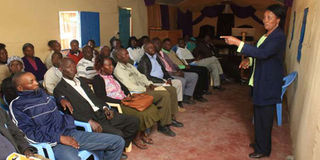Men have strong role in stopping violence against women

Training on how to identify, handle and solve cases of gender-based violence at Chaka trading centre in Nyeri on October 19, 2016. PHOTO | JOSEPH KANYI | NATION MEDIA GROUP
What you need to know:
We are a nation that has for many years treated its women badly.
I have had times when I am filled with hope, dreaming that my daughters will grow in a much better world than that of my mother.
I have had the image of Jackline Mwende, the woman whose hands were allegedly hacked off by her husband for not being able to conceive children, lodged in my head for days. The huge rugged scars on her face, the bandaged stumps where her hands had been and the pain written on her face.
I am a father of two daughters. Whenever I think about the best thing I would like to achieve for myself before I exit here, I think of my daughters. Whether they will grow to achieve their dreams in life, whether they will live in a world that will give them a chance to reach for the desires of their hearts regardless of their skin colour or gender.
Perhaps that’s why the image of Mwende traumatised me. Or perhaps it’s because of my parents’ violent past. From the age of seven, I was brought up by a single mother. I remember so vividly the night that my dad almost killed my mother. I remember how we – my mother, 10-year-old brother, and I – scaled fences and dodged bushes as we ran for our lives.
I remember a tremendously humiliating day three mornings after. My mother was a school teacher. Seeing her at school after that weekend, in front of my peers, with a black eye and swollen lip is the single most humiliating experience of my life. I talked to her about it this week – 31 years after that morning – asking why it is she had to come to school in that condition. She told me she could not secure leave from school for a few days until she healed.
TREATED BADLY
We are a nation that has for many years treated its women badly. From home to the workplace to the church. I have had times when I’m filled with hope, dreaming that my daughters will grow in a much better world than my mother’s.
But the brutality I see, which paints a picture of something pulled from the dark ages, shatters my hopes. The injuries to Mwende. The stabbing to death of Edinald Atieno. The running over of Margaret Wambui with a vehicle. The slapping of Rachel Shebesh.
When Kenya voted in the constitution in 2010, and gave thumbs up to the two-thirds gender rule, I dreamt of a better world for my daughters and other girls of their generation. But look at what we have done. A Bill to entrench the rule into law was recently rejected by Parliament.
Later in life, I came to learn to forgive my dad. Before he died last year he would throw strong hints about some of his missed chances with my mum, teaching me that treating others badly often comes back to bite us. We, the Kenyan men, have a strong a role in this fight. Until we rally our humanity to say no to a situation that oppresses more than half of our population, we consign ourselves to doom.
Ernest Waititu is a communication expert working in Geneva, Switzerland.




